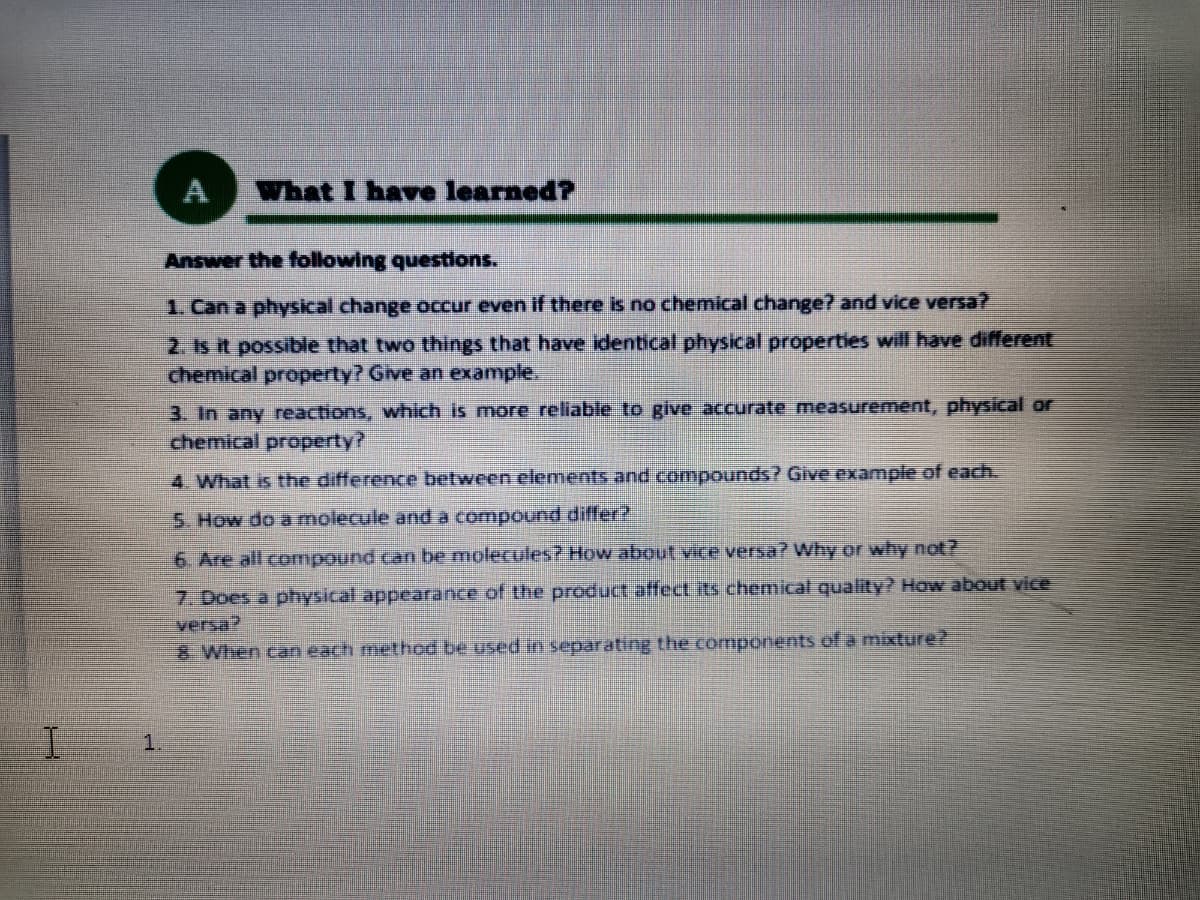A What I have learned? Answer the following questions. 1. Can a physical change occur even if there is no chemical change? and vice versa? 2. Is it possible that two things that have identical physical properties will have different chemical property? Give an example. 3. In any reactions, which is more reliable to give accurate measurement, physical or chemical property? 4. What is the difference between elements and compounds? Give example of each.
A What I have learned? Answer the following questions. 1. Can a physical change occur even if there is no chemical change? and vice versa? 2. Is it possible that two things that have identical physical properties will have different chemical property? Give an example. 3. In any reactions, which is more reliable to give accurate measurement, physical or chemical property? 4. What is the difference between elements and compounds? Give example of each.
General, Organic, and Biological Chemistry
7th Edition
ISBN:9781285853918
Author:H. Stephen Stoker
Publisher:H. Stephen Stoker
Chapter1: Basic Concepts About Matter
Section: Chapter Questions
Problem 1.36EP: Consider two boxes with the following contents: the first box contains 10 blue paper clips and 10...
Related questions
Question

Transcribed Image Text:A
What I have learned?
Answer the following questions.
1. Can a physical change occur even if there is no chemical change? and vice versa?
2. Is it possible that two things that have identical physical properties will have different
chemical property? Give an example.
3. In any reactions, which is more reliable to give accurate measurement, physical or
chemical property?
4. What is the difference between elements and compounds? Give example of each.
5. How do a molecule and a compound differ?
6. Are all compound can be molecules? How about vice versa? Why or why not?
7. Does a physical appearance of the product affect its chemical quality? How about vice
versa?
8 When can each method be used in separating the components of a mixture?
1.
Expert Solution
This question has been solved!
Explore an expertly crafted, step-by-step solution for a thorough understanding of key concepts.
Step by step
Solved in 4 steps

Recommended textbooks for you

General, Organic, and Biological Chemistry
Chemistry
ISBN:
9781285853918
Author:
H. Stephen Stoker
Publisher:
Cengage Learning

General Chemistry - Standalone book (MindTap Cour…
Chemistry
ISBN:
9781305580343
Author:
Steven D. Gammon, Ebbing, Darrell Ebbing, Steven D., Darrell; Gammon, Darrell Ebbing; Steven D. Gammon, Darrell D.; Gammon, Ebbing; Steven D. Gammon; Darrell
Publisher:
Cengage Learning


General, Organic, and Biological Chemistry
Chemistry
ISBN:
9781285853918
Author:
H. Stephen Stoker
Publisher:
Cengage Learning

General Chemistry - Standalone book (MindTap Cour…
Chemistry
ISBN:
9781305580343
Author:
Steven D. Gammon, Ebbing, Darrell Ebbing, Steven D., Darrell; Gammon, Darrell Ebbing; Steven D. Gammon, Darrell D.; Gammon, Ebbing; Steven D. Gammon; Darrell
Publisher:
Cengage Learning


World of Chemistry, 3rd edition
Chemistry
ISBN:
9781133109655
Author:
Steven S. Zumdahl, Susan L. Zumdahl, Donald J. DeCoste
Publisher:
Brooks / Cole / Cengage Learning

Chemistry: The Molecular Science
Chemistry
ISBN:
9781285199047
Author:
John W. Moore, Conrad L. Stanitski
Publisher:
Cengage Learning

Introductory Chemistry: An Active Learning Approa…
Chemistry
ISBN:
9781305079250
Author:
Mark S. Cracolice, Ed Peters
Publisher:
Cengage Learning